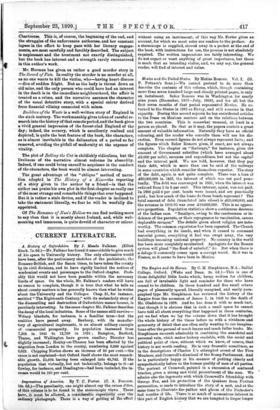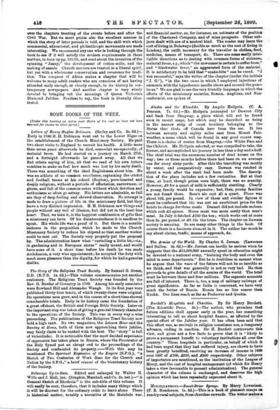The Empire and its Heroes. By C. H. Simpkinson, M.A.,
Balliol College, Oxford. (Wake and Dean. 2s. 6d.)—This is one of those delightful little books which, being written for children, are full of invaluable light and reminder for those who have ceased to be children. In three hundred and five small octavo pages of pleasantly spaced, liberally margined, and easily para- graphed type Mr. Simpkinson has reviewed the history of the Empire from the accession of James I. in 1603 to the death of Mr. Gladstone in 1898. And he has done it with so much tact, that though it is obvious that in such a small space he cannot have told all about everything that happened in three centuries, yet we feel when we lay the volume down that it has brought the whole history of the times before us with a vividness and generosity of detail that are often sadly wanting to our imagina- tions after the perusal of much longer and much fuller books. Mr. Simpkinson succeeds admirably in combining the anecdotal and personal vein, which makes history readable, with the social and political point of view, without which we know, of course, that history is not worth reading. He is very dramatic sometimes, as in the descriptions of Charles I.'s attempted arrest of the Five Members, and Cromwell's dismissal of the Rump Parliament. And he is particularly happy in his manner of putting clearly and sympathetically before us the human quality of men of all parties. The portrait of Cromwell, painted in a succession of scattered touches, gives a strong and vivid presentment of the man. We admire also the ingenuity with which Cromwell's friendship with George Fox, and his protection of the Quakers from Puritan persecution, is made to introduce the story of a sect, and at the same time to illustrate the pathos and gloom of the Pretectoes last months of life. There is so much of momentous interest in this part of English history that we are tempted to linger longer over the chapters treating of the events before and after the Civil War. But we must praise also the excellent manner in which the story of later periods is told, and the skill with which commercial, educational, and philanthropic movements are made interesting. We recommend anyone who is looking through the book to see if it will satisfy the modern requirements in these matters, to turn up pp. 191.93, and read about the invention of the spinning " Jenny," the development of cotton-mills, and the making of canals. Church matters are treated in a liberal spirit, but yet with a wholesome conservatism and reverence for tradi- tion. The conquest of Africa makes a chapter that will be welcome to many adult readers who are conscious of not having attended early enough, or closely enough, to its history in con- temporary newspapers. And another chapter is very wisely devoted to bringing out the meanings cf Queen Victoria's Diamond Jubilee. Needless to say, the book is liberally illus- trated.



































 Previous page
Previous page